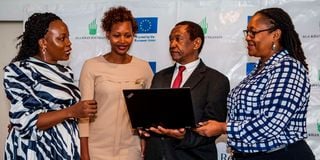Curtain falls on Aga Khan, EU Sh1.4bn Covid programme

Aga Khan Foundation Regional Programme Manager Jacintah Mwachiro, Programme Manager Aga Khan Hospital Dar-es-Salaam Teresia Muhere, Aga Khan Foundation Regional Award and Grants Manager Daniel Muraya and Programme Manager Aga Khan Foundation Mozambique Elsa Semo confer during the release of the impact of the Eastern Africa Regional Covid-19 Response Programme On June 7, 2023 at The Sarova Panafric Hotel in Nairobi.
Millions of people across Kenya, Uganda, Tanzania and Mozambique have been impacted by the 9.4 million euros (Sh1.4billion) funding through the Aga Khan Development Network -Eastern Africa Regional Covid-19 Response Programme that is set to officially come to an end this month.
This was revealed during the end-of-programme review meeting for the Eastern Regional Covid-19 Response Programme in Nairobi on Wednesday where the joint partners and funders of the programme, the European Union and Aga Khan Foundation met to evaluate the project.
Officially launched in December 2020, the fund has been running for the last 30 months. It was jointly funded by the EU (6.2 million euros) and AKF (3.2 million euros).
The programme sought to improve systemic, gender-sensitive responses to overcome the health, economic, and social vulnerabilities caused by the Covid-19 pandemic in Eastern Africa (Kenya, Uganda, Tanzania, and Mozambique).
This goal was achieved through a three-pillas that included overcoming vulnerabilities among target communities, enhancing their capacity to cope with the impact of Covid and improving health delivery systems.
Speaking during the meeting, Henriette Geiger, the EU Ambassador to Kenya said the partnership enabled the Union to provide crucial support in the health sector during the most acute phases of the Covid-19 pandemic. This, she said, helped them provide some relief on the social and economic challenges faced by many communities.
“I am delighted to see many positive outcomes of the interventions, especially in the livelihoods component that will continue to benefit young people to provide for themselves and their families and enable them to live healthy lives.” Ms Geiger said.
The programme supported 25 public healthcare facilities across Kenya, Uganda, Tanzania and Mozambique by building capacity of more than 1500 healthcare staff, supplying hospital equipment and PPEs, and improving existing infrastructure, including digital health platforms. The programme has been running for 30 months since its launch in December 2020.
On his part, the Aga Khan Foundation Regional CEO Riaz Nathu said the programme had built community resilience by increasing COVID-19 awareness among vulnerable groups and training young journalists to share stories of hope.
The project also roped in 267 local civil society organizations (CSOs) to reach the most vulnerable community members’ needs through training and rapid deployment of funds.
“Partnering with local CSOs strengthened our capacity and innovation skills to meet community needs and created a platform for interaction and networking for Civil Society Organizations’ members,”Mr Nathu said.
For Aga Khan Foundation Regional Award and Grants Manager Daniel Muraya the region’s healthcare systems were gravely affected by the Covid-19 pandemic and he is sure the programme’s intervention strengthened health systems through training of frontline healthcare workers. It also supported government health facilities through the supply of PPEs, COVID-19 testing kits, intensive care equipment and medical goods, and digital healthcare equipment including infrastructure renovation.
Different life skills
At least 45,000 youth were taught on different life skills that will help them make a living across the region even as young girls were educated on Sexual Reproductive Health (SRH), Gender Based Violence (GBV) and Mental Health services and information.
The youth were also supported through innovation grants and design sessions to improve livelihood opportunities.
“The youth learning platforms created interactions between the youth and adolescents will continue to provide youth-friendly spaces for young people to network, share innovative ideas and local solutions to community challenges,” added Riaz.
One hundred captivating stories of hope have since been shared through different platforms and mainstream media houses on how people navigated and strived through challenging times to ward off the negative pall cast
by the pandemic.
Other implementing partners in the project included the Aga Khan Foundation (Kenya, Tanzania, Uganda, and Mozambique), Aga Khan Health Services (Kenya and Tanzania), Aga Khan University Hospital, Aga Khan University (Institute for Human Development, and the Graduate School of Media Studies & Communication), and Triggerise Stitching.





